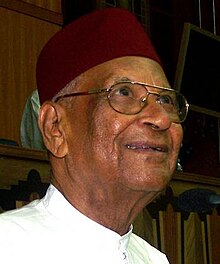Amadou-Mahtar M'Bow
Amadou-Mahtar M'Bow (born March 20, 1921 in Dakar , Senegal ) is a former Senegalese politician . He was Director General of UNESCO from November 15, 1974 to November 14, 1987 (two terms of office).
After a Francophone upbringing, he became a teacher of history and geography , then held managerial positions in the educational system of the pre-independent Senegal. He was committed to the independence of his country, was Minister for Education (1966–1968) and for Culture and Youth of Senegal (1968–1969). His formative influence on UNESCO began in 1967 as head of his country's delegation to the 14th UNESCO General Conference. In the same year he was elected a member of the Executive Council. In 1970 he was appointed Associate Director General for Education. Elected Director General of UNESCO in 1974, he became the first African head of a specialized agency of the United Nations . His struggle against freedom of the press under the slogan of a " New World Information and Communication Order " caused a crisis for UNESCO that could only be resolved with the end of the Cold War.
M'Bow saw himself primarily as an advocate for the Third World and the interests of Africa . His aim was to put UNESCO, beyond its mainly normative function, at the service of the development problems of the countries of Africa, Asia and Latin America . After a successful first mandate (1974–1980), he was unanimously elected for a second mandate (1980–1987) by the member states in 1980.
In recognition of his political activities, M'Bow has received numerous national and international awards as well as many honorary doctorates.
During his tenure, conflicts between East and West and North and South manifested themselves in majority decisions against Israel and the concept of a “ New World Information and Communication Order ”. This was understood to mean the “liberation of developing countries from the state of dependency” of western (free) media.
M'Bow also formulated the “compromise text” of the media declaration passed in 1978 and thus, in his own opinion, prevented worse.
In response to the policies of M'Bow and UNESCO, and additionally criticized for excessive centralization and other management deficiencies, M'Bow was the main reason for the United States' withdrawal from UNESCO in 1984. At the same time, Great Britain and Singapore withdrew from UNESCO which in turn led to a financial and substantive crisis and prevented the re-election of M'Bow for a third term of office, which he and many third world countries wanted.
Honors
- 1982 Honorary Doctorate from Laval University
Individual evidence
- ↑ 19th General Conference of UNESCO.
- ↑ Les récipiendaires de doctorats honoris causa de l'Université Laval, as of August 22, 2011 Amadou-Mahtar M'Bow on page 18 of the PDF file 0.816 MB
Web links
- Literature by and about Amadou-Mahtar M'Bow in the catalog of the German National Library
| personal data | |
|---|---|
| SURNAME | M'Bow, Amadou-Mahtar |
| ALTERNATIVE NAMES | M'Bow, Amadou-Mahtae |
| BRIEF DESCRIPTION | Senegalese politician and Director General of UNESCO |
| DATE OF BIRTH | March 20, 1921 |
| PLACE OF BIRTH | Dakar , Senegal |

